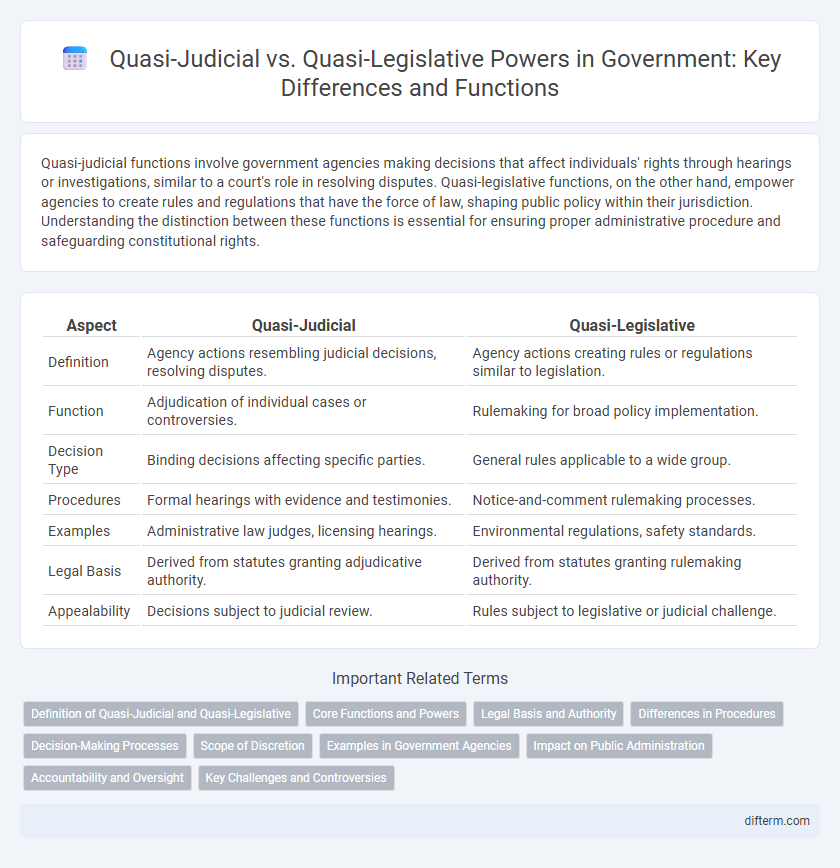Quasi-judicial functions involve government agencies making decisions that affect individuals' rights through hearings or investigations, similar to a court's role in resolving disputes. Quasi-legislative functions, on the other hand, empower agencies to create rules and regulations that have the force of law, shaping public policy within their jurisdiction. Understanding the distinction between these functions is essential for ensuring proper administrative procedure and safeguarding constitutional rights.
Table of Comparison
| Aspect | Quasi-Judicial | Quasi-Legislative |
|---|---|---|
| Definition | Agency actions resembling judicial decisions, resolving disputes. | Agency actions creating rules or regulations similar to legislation. |
| Function | Adjudication of individual cases or controversies. | Rulemaking for broad policy implementation. |
| Decision Type | Binding decisions affecting specific parties. | General rules applicable to a wide group. |
| Procedures | Formal hearings with evidence and testimonies. | Notice-and-comment rulemaking processes. |
| Examples | Administrative law judges, licensing hearings. | Environmental regulations, safety standards. |
| Legal Basis | Derived from statutes granting adjudicative authority. | Derived from statutes granting rulemaking authority. |
| Appealability | Decisions subject to judicial review. | Rules subject to legislative or judicial challenge. |
Definition of Quasi-Judicial and Quasi-Legislative
Quasi-judicial refers to government actions or agencies that have the authority to interpret laws, adjudicate disputes, and make decisions similar to a court, often involving hearings and evidence evaluation. Quasi-legislative pertains to the power of administrative agencies to create rules and regulations that have the force of law, shaping public policy within their jurisdiction. Both functions are essential in administrative law, balancing judicial procedures with legislative rule-making processes.
Core Functions and Powers
Quasi-judicial bodies have the core function of adjudicating disputes and resolving specific legal issues, exercising powers similar to courts such as hearing evidence, interpreting rules, and issuing binding decisions. Quasi-legislative agencies primarily focus on creating, amending, and enforcing regulations within their jurisdiction, implementing policies through rulemaking authority granted by enabling statutes. Both types of bodies operate within government frameworks but differ in their emphasis on decision-making versus regulatory rule creation.
Legal Basis and Authority
Quasi-judicial agencies derive their legal basis and authority from specific statutes that empower them to adjudicate disputes, make binding decisions, and enforce compliance within a defined scope, often resembling court functions. Quasi-legislative bodies obtain authority through enabling legislation that grants rulemaking powers to enact regulations with the force of law, typically focusing on policy development and administrative regulations. Both forms of agencies operate under delegated powers from the legislature but differ fundamentally in their roles: quasi-judicial bodies interpret and apply laws, while quasi-legislative entities formulate rules and standards.
Differences in Procedures
Quasi-judicial procedures involve formal hearings where evidence is presented, witnesses testify, and decisions are made based on facts and legal standards, often resembling court trials. Quasi-legislative procedures focus on rulemaking processes, including public notice, comment periods, and deliberations, aiming to create policies or regulations rather than adjudicating individual cases. The key procedural difference lies in quasi-judicial functions emphasizing case-specific rulings while quasi-legislative functions prioritize broader regulatory frameworks.
Decision-Making Processes
Quasi-judicial bodies make decisions by applying existing laws to specific cases, ensuring a fair hearing and evidence evaluation similar to courts. Quasi-legislative agencies create rules and regulations that have the force of law, shaping public policy through public notice and comment procedures. The key distinction lies in quasi-judicial decision-making resolving disputes, while quasi-legislative actions establish broad regulatory frameworks.
Scope of Discretion
Quasi-judicial agencies exercise discretionary powers by interpreting laws and resolving disputes on specific facts, often imposing penalties or sanctions based on regulatory statutes. Quasi-legislative agencies hold broader discretion to create rules and regulations with the force of law, shaping policy within the boundaries set by the enabling legislation. The scope of discretion in quasi-judicial actions is fact-specific and case-oriented, while quasi-legislative discretion emphasizes policy-making and general applicability.
Examples in Government Agencies
Quasi-judicial functions in government agencies include decisions made by administrative bodies like the Social Security Administration or the National Labor Relations Board, where they resolve disputes or enforce regulations in a judicial manner. Quasi-legislative actions are exemplified by entities such as the Environmental Protection Agency or state public utility commissions, which create rules and policies with the force of law through rulemaking processes. These distinctions highlight how agencies balance adjudicating individual cases and establishing broader regulatory frameworks within the government.
Impact on Public Administration
Quasi-judicial functions in government allow administrative agencies to interpret and enforce laws by resolving disputes and making binding decisions, which ensures accountability and fairness in public administration. Quasi-legislative functions involve the creation of rules and regulations that have the force of law, enabling agencies to establish standards and policies that guide public behavior and agency operations. The distinction impacts public administration by balancing regulatory flexibility with legal oversight, shaping how agencies implement government policies and protect citizens' rights.
Accountability and Oversight
Quasi-judicial bodies exercise accountability through formal hearings and evidentiary standards, ensuring decisions are subject to judicial review for procedural fairness and legality. Quasi-legislative agencies are accountable via rulemaking transparency, public participation, and legislative oversight committees monitoring regulatory compliance and policy impact. Both types require distinct oversight mechanisms to balance efficient governance with protection of individual rights and public interests.
Key Challenges and Controversies
Quasi-judicial actions often face challenges regarding impartiality and due process, leading to controversies over potential biases and fairness in administrative hearings. Quasi-legislative functions encounter disputes related to the scope of authority and public participation, raising concerns about transparency and accountability in rulemaking. Both processes grapple with balancing efficient decision-making and safeguarding constitutional rights within government regulations.
Quasi-judicial vs Quasi-legislative Infographic

 difterm.com
difterm.com